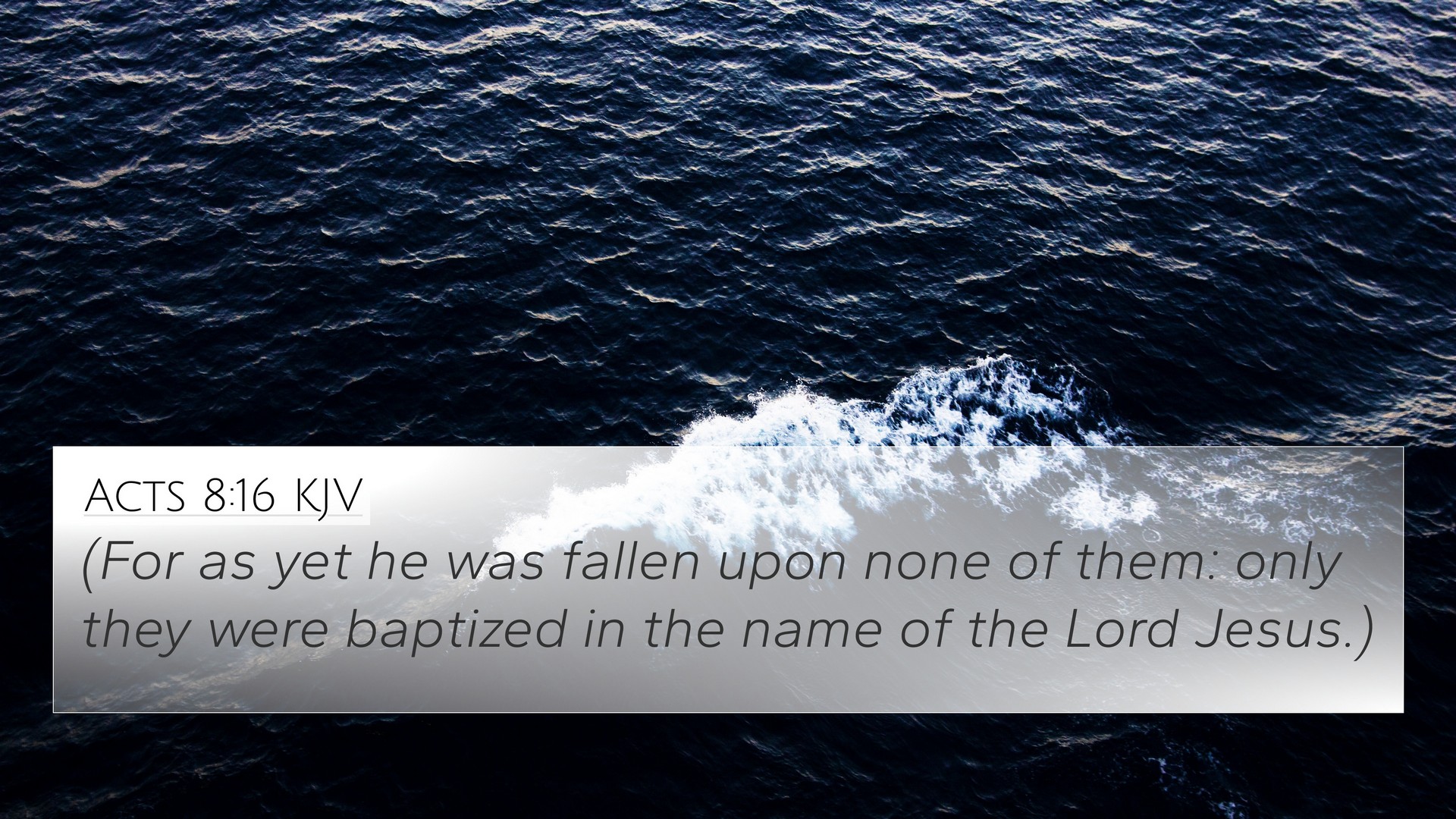Understanding Acts 8:16
Acts 8:16 states: "For as yet he was fallen upon none of them: only they were baptized in the name of the Lord Jesus." This verse occurs in the context of the early church's expansion and signifies a key moment in the establishment of the Christian community. The verse indicates that while the new believers in Samaria were baptized in the name of Jesus, they had not yet received the Holy Spirit.
To comprehend the depth of this verse, it's essential to look at insights from public domain commentaries, including those by Matthew Henry, Albert Barnes, and Adam Clarke.
Insights from Commentaries
Matthew Henry's Commentary
Matthew Henry explains that the actions of the apostles in Samaria were notable for their assertion of the name of Jesus in baptism. He emphasizes that baptism signifies a public profession of faith, and the Samaritans, despite their faith, had not yet received the Holy Spirit. This absence highlights the essential teaching that believers should seek a deeper communion with God through the Holy Spirit.
Albert Barnes' Notes
Albert Barnes expands on this by noting that the falling of the Holy Spirit upon believers was a distinct and significant act of God, later occurring during the apostles' visit. He points out that this event underscores the necessity of the apostles' role in the initial spread of the Gospel. Additionally, it serves as a pivotal link to seeing how early church practices were established.
Adam Clarke's Commentary
Adam Clarke elucidates that the Holy Spirit's absence at the time of baptism among the Samaritans emphasized the unique role of the apostles. He argues that it was a preparatory step for the larger mission to the Gentiles and demonstrates both the continuity and the evolving understanding of the church's mission. Clarke stresses the point that to be fully embraced into the community of faith, one must receive the Holy Spirit.
Bible Cross-References
Understanding Acts 8:16 can benefit from inter-Biblical dialogue and cross-referencing with other scriptures that discuss baptism and the Holy Spirit. Here are key cross-references related to this verse:
- Matthew 28:19 - The Great Commission, where Jesus commands baptism in the name of the Father, Son, and Holy Spirit.
- John 7:39 - This verse clarifies the concept of the Holy Spirit not being given until Jesus was glorified.
- Acts 2:38 - Peter's call for repentance and baptism for the remission of sins, emphasizing the role of the Holy Spirit.
- Acts 10:44-47 - The account of the Holy Spirit falling on the Gentiles, linking their experience to that of the Samaritans.
- Romans 8:9 - Discusses the necessity of having the Spirit of Christ, which indicates one's belonging to Him.
- 1 Corinthians 12:13 - Highlights that all believers are baptized into one body by the Holy Spirit, regardless of their background.
- Ephesians 4:5 - Reiterates the one baptism, linking themes of unity within the faith community.
Thematic Connections in Scripture
The relationship among these verses offers a broad thematic understanding of baptism and the reception of the Holy Spirit:
-
Faith and Baptism: Acts 8:16 illustrates that while baptism is a vital act of faith, it is also a precursor to a deeper experience of the Holy Spirit.
-
Apostolic Authority: The distinct event of the Holy Spirit's arrival with the apostles signifies the continuation of Jesus' mission and authority through His appointed leaders.
-
Unity in Diversity: The context of Samaritans receiving the Holy Spirit demonstrates the inclusive aspect of the Gospel, bridging ethnic and cultural divides.
-
The Role of the Holy Spirit: This verse prepares the reader to understand the essential work of the Holy Spirit in fulfilling the promises of God to all believers.
Cross-Referencing Tools and Methods
For those studying this verse, utilizing various tools and methods for Bible cross-referencing can enhance comprehension and enrich understanding. Here are a few recommendations:
- Bible Concordance: A concordance can help locate where specific themes, terms, or concepts appear throughout the scriptures.
- Cross-Reference Bible Study: Engage with Bibles that include cross-references in their margins to connect verses thematically.
- Comprehensive Bible Cross-Reference Materials: Utilize study aids that provide extensive cross-referencing options for deeper biblical analysis.
- Bible Reference Resources: Online tools and software can aid in identifying connections, facilitating broad studies of scripture.
- Cross-Referencing Bible Study Methods: Techniques that emphasize thematic links can help learners see the Bible's interconnected messages.
Conclusion
Acts 8:16 not only speaks to the experience of the Samaritans but also opens a gateway to understanding baptism's role and the work of the Holy Spirit within the early church. By engaging with commentaries and utilizing cross-references, one can appreciate how various biblical texts inform each other, nurturing a deeper understanding of faith and community in Scripture.










